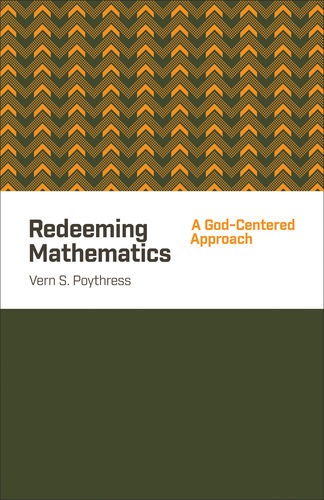Vern Poythress: Redeeming Mathematics
 Vern S. Poythress, Redeeming Mathematics: A God-centered Approach (Wheaton, IL: Crossway, 2015), 208 pages, ISBN 9781433541100.
Vern S. Poythress, Redeeming Mathematics: A God-centered Approach (Wheaton, IL: Crossway, 2015), 208 pages, ISBN 9781433541100.
Vern Poythress is uniquely qualified to write on the topic of theology and math because he holds terminal degrees in both subjects. Right from his introduction, Poythress admits that most people never think of connecting God and numbers. He hopes this book helps to change that because he believes that all human activity, including mathematics, should be performed as an act of worship.
In Part 1, Basic Issues, Poythress begins by discussing for math’s universality in all possible worlds. For example, is it not true that 2 + 2 = 4 is a true equation in all times and places? In this regard, Poythress shows that math shares characteristics with God, namely math too is omnipresent and eternal. He continues to argue for the divine characteristics of math by showing how math works in the transcendent and immanent realms, that it is beautiful, and incomprehensible.
Poythress’s approach will help Christians think in a more integrated fashion about how their faith connects with the created world.
Poythress ends Part 1 describing how mathematics can accord with John Frame’s three perspectives on ethics, a heuristic device he uses throughout the remainder of the book. Poythress shows how mathematics connects with relationships between things, perspectives, logic, and even social sciences. Thus like God who created all of these items, math too connects with all. The effect of Poythress’s argument in Part 1 is that Christians have another argument in favor of not just theism, but Trinitarian theism. Though doubtful that it will have a powerful effect for apologetic purposes, I have little doubt that Poythress’s approach will help Christians think in a more integrated fashion about how their faith connects with the created world.

Vern S. Poythress
Part 2, Our Knowledge of Mathematics, addresses the philosophical issues of transcendence/immanence and necessity/contingency. Is God connected with numerical truth (immanence) or is he removed from that truth (transcendence)? Likewise, are mathematical truths necessary or are they contingent. Poythress shows how the Christian should conceive of these notions in contrast with the answers given by non-believers.
Part 3, Simple Mathematical Structures, discusses addition, sequences, multiplication, symmetries, and sets. Poythress repeatedly shows how mathematical conclusions are connected to the mind of God. In this way, we can trust the truthfulness of mathematical conclusions because God thinks them. Now Poythress doesn’t fall into the error that our thoughts are identical with God’s. He affirmed earlier that our knowledge is analogical. But Poythress rejects the notion that our limitations fail to have real meaning or value.
Part 4, Other Kinds of Numbers, delves into fractions, negative numbers, irrational numbers, imaginary numbers, and infinity. In each of these cases, Poythress argues that they are not merely human inventions. These number show both the infiniteness of God as well as the limits of human thinking. Part 5, Geometry and Higher Mathematics, followed by a section entitled “Supplements” concludes the text. Poythress shows how math relates to space. He recognizes that geometry is an idealized representation of reality (i.e. no one can draw a perfectly straight line). But we can still have trust in the math because God ordained space and math. The supplement section contains short essays discussing non-Christian philosophies of math and Christian theories of math respectively.
Readers will find Poythress’s book evocative, encouraging them to think about the relationship between God and math.
In the end, readers will find Poythress’s book evocative, encouraging them to think about the relationship between God and math. But those wishing a fuller explanation will have to consult additional books.
Reviewed by Stephen M. Vantassel
Publisher’s page: https://www.crossway.org/books/redeeming-mathematics-tpb/


